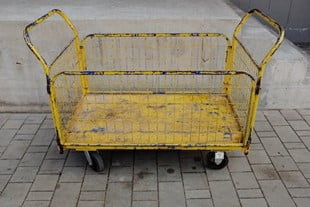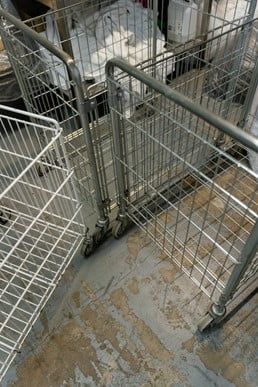£0.00
0Signs to replace your castors
When should I replace my castors?
What signs should I look for that indicate I need to replace my castor wheels?
Castors are designed to ensure that your equipment operates smoothly and has a low roll resistance so making it easier and safer to move and manoeuvre loads.
Over time, no matter how well maintained they are, castor wheels can become damaged and show signs of deterioration that will start to affect the performance of the castor and its ability to do its job.
Regular maintenance can help prolong the life of a castor but if your castors are displaying clear signs of wear and tear, then you should consider replacing them, and soon.
Replacing them before they fail will save you time and money in the future.
Failing Castors – what are the signs to look out for?
There are numerous signs that will give you advanced warning that your castors need replacing. If you spot these signs early on, then you can arrange for them to be replaced when you choose to do so and not be forced into action when they do properly fail. By being proactive you can avoid the lost time and frustration associated with broken castors. You will also avoid the risk of equipment or people being damaged and the costs and lost productivity that would go with that.
What are the main signs of impending castor failure.
Lack of Manoeuvrability
One clear sign is if your equipment becomes difficult to manoeuvre. Equipment that used to roll with a slight push for example, now needs far greater effort to get it moving.
When the castor wheels are new, roll resistance is low and your equipment moves easily under load. After years of use, the castor wheels will suffer from increasing roll resistance which can make pushing and moving the items difficult. This situation will reduce efficiency and productivity in the workplace as equipment becomes harder to manoeuvre.
There are a variety of reasons why this loss of manoeuvrability may occur:
- Lack of lubrication: You should check that the castors have been maintained regularly and apply grease if necessary. If this doesn’t resolve the issue, then replacement castors are needed.
- Damage to the castors: As you can image Castors can be damaged in many ways, including through misuse such as overloading. Check your castors for obvious damage and ensure that no debris is trapped anywhere. Also, check that your castors have not become loose as this can also be a cause of poor manoeuvrability.
If you spot any sign of obvious damage, then you should definitely plan to replace it. If the castor looks misshapen, dented, crooked or in any way deformed it will soon need replacing as this won’t just affect manoeuvrability but also the load that can be carried safely.
Worn or damaged treads
You should inspect the castor treads for signs of damage as this is a very common problem which can cause difficulty in rolling and cornering, which in turn can lead to uneven movement and poor control.
- Cracks in the tread – this can be the result of several factors such as castors being left outdoors, over exposure to UV radiation, water or other fluids, excessive loads being carried or simply using a wheel material which is not suited to the application.
Cracks are more likely to occur with soft rubber-based castors than harder wearing nylon ones.
Unfortunately, operators often continue to use equipment where castors have clear signs of excessive wear and tear on the treads. This just causes further damage and loss of efficiency, even though it is very simple to remove and replace the castor as the bracket is still likely to be in good condition.
- Chips – The tread may become chipped with parts missing or you could see debris trapped within the tread. If there is a lot of debris accumulated in the tread which is not easily removable then for ease of use and efficiency of operation, you should consider replacing the castor.
- Flat Spots – You might also see ‘flat spots’ on the wheels, which will definitely make them difficult to roll. Flat spots can be caused when castors are stationary for prolonged periods of time. Also, certain castor compounds are affected by heat or particular liquids causing them to soften and allowing flat spots to form.
Please be aware that prevention is always cheaper than cure so using castors that are suitable for your application is the best way to avoid early castor failures.

If you are not sure which type of castor wheel you need, please just contact us for advice, we’d be delighted to hear from you.
- Bearings – The bearings in your castor can become loose or suffer wear over a long period of time. A clear sign that this is happening is if the castor is wobbly or experiences slippage. The bearings cannot easily be replaced, so it is far cheaper and simpler to replace the entire castor in this case.
- Damage to plates / brackets – In many cases only the castors need be replaced, but if there is any sign of damage to the assembly unit itself, then this will need to be replaced too. Such damage is likely to be caused by high energy impacts. The other common cause of assembly unit damage is corrosion – especially when the castor is exposed to chemicals or other adverse environmental conditions.

Listen for Noises
Loud or unusual noises – such as creaking, rattling, squeaking or screeching when you are using your trolley, cart or any other moving equipment is another clear sign that your castors are going to need replacing.
If you hear a rattling sound,this could indicate that the axle hole is worn and the castor wheel is becoming loose or that the bearings are worn. In either case the castor needs to be replaced.
A screeching sound, like metal rubbing against metal, can also indicate a problem with the bearings. If lubricating the bearings does not fix this, then it is an indication that the bearings are worn or missing and that the castor needs replacing.
The noise you hear may come from the tread, indicating that the tread is damaged as discussed above.
If your castors are unusually noisy, they should be replaced as soon as possible to avoid damage to other parts of the castor assembly unit or to the moving equipment itself.
Signs of floor damage
If you start to notice damage to the floor such as scrapes and scratches, markings, or chipping, then you should inspect your castors for signs of wear as highlighted the above. Old or damaged castors should always be replaced. They are on their way to failing but could cause floor damage before they do.
Replacing castors is simple!
If you need to replace your castors, you have several options. You can replace the entire castor unit, parts of it or just the castor wheel itself. When replacing, it is important that you choose a good quality castor that is suitable for your application. Most castors are designed so that they can be easily removed from the bracket (fixing) meaning that only the castor wheel needs to be replaced. This ensures that castor replacement is quick, easy and economical.
If your castors are failing earlier than you would expect, it could be that you are not using the correct castors for the job. If you are not sure which type of castor wheel you need to meet your specific requirements contact us – we are always ready to listen and assist.
If it is just the castor you are replacing, then the replacement castor should simply slot into the fittings of the old castor. In most cases the fixings will either be bolt hole, stem fitting or a plate fixing.

We always have thousands of castors and wheels in stock. See our range of castors here and use the handy on-page filters to help you select the right castor for you. There is also more information in our guide to buying castors.
Alternatively, you can give us a set of measurements via our online form and we will be able to see if we have something suitable that isn’t on our website or we can look to manufacture this for you.
Give us a call!
But if you would rather speak to a specialist please call us – we’d be delighted to speak to you. Our specialist can advise which castor will be the most suitable for your applications. We know our castors! We’ll be happy to help you.

